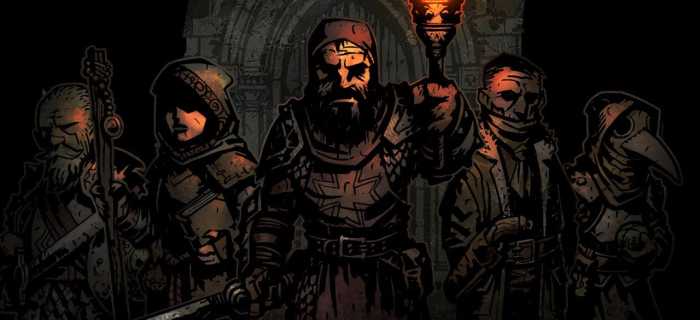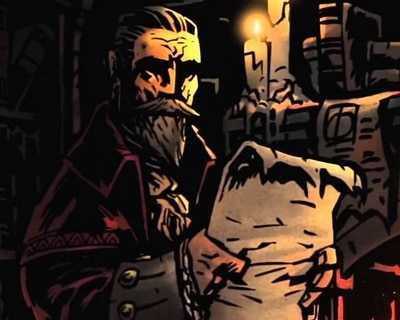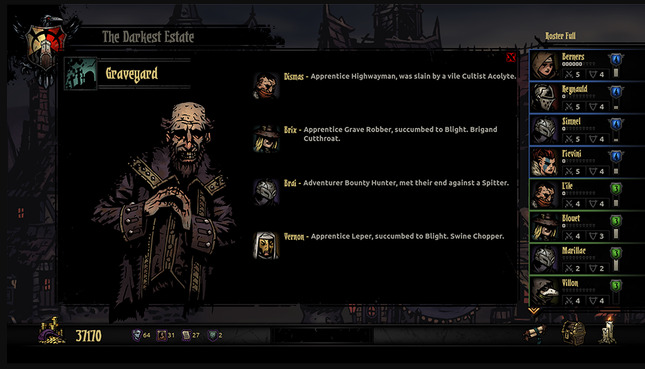“Darkest Dungeon”: The weight of legacy

Darkest Dungeon is a turn-based RPG with rogue-like elements released in 2016. Players are tasked with a clear mission to explore the titular “Darkest Dungeon” and seal whatever calamity is within it. The game takes heavy influence from H.P Lovecraft, the developer is even named “Red Hook” which is a reference to one of his works.
The one character who the player will hear the voice of is “The Ancestor” who not only calls the player to the Hamlet in the game’s opening cinematic but narrates every battle, adding commentary on the player’s choices, the loss of units in battle or during a run, successful hits on enemies, his voice is one of the most prominent elements of the game and it ties to a theme within the greater game, the burden of legacy.
Who was “The Ancestor”
“Ruin has come to our family”
The Ancestor

Only known by the title, “The Ancestor” is a character whose evil is interwoven within the narrative. In the beginning, they appear to be some sort of aristocrat who stubbled onto a cursed evil, but by the end of the base game, they’re revealed to have been just as much of a monster as any of the horrors the player has faced.
From what the Ancestor admitted, they murdered numerous people, engaged in necromancy, and hired bandits as a personal militia. They’re personally responsible for almost every Boss Monster the player encounters and the corruption of the playable area is almost solely his responsibility. Some notable examples of his depravity are seen in his dealings in necromancy, killing his trainers and resurrecting them before seemingly getting bored of the project and leaving it to fester turning his ancestral home into the Ruins.
His dabbling in blood magic led to the creation of the Swine Prince and The Flesh along with the collapse of the Warrens into a festering pit of blood-seeking half-pig humanoids.
He personally contributed to the downfalls of “The Hag” in the Weald and “The Siren” in the Cove respectively. One was an associate whom he came to find distasteful and the other an admirer who he saw as a sacrifice for more gold for his coffers.
Not to mention the Drowned Crew whom he killed for charging him more as his ambition drove them into more and more hazardous missions, or as he frames it “crude extortion” or the Miller whose life he ruined seemingly for no reason. The Ancestor was a monster far before the madness he unleashed drove him to completely forsake his humanity. And his legacy is your burden to undo.
The burdens of legacy

At no point, during the game of Darkest Dungeon are you condemned for what you do to your units. You may feel guilt when one of your adventurers dies, but the game treats death more as an inevitability than as attributable to bad planning.
Within the game’s world, the consequences of your Ancestor’s cruelty and vile acts stain the game’s world but you’re never accosted. As the player, you’re rarely even addressed as an entity.
The problems he left behind are not his concern. He leaves them to you to solve, an individualized example of a systemic issue between the past and present.
In the game, there’s little acknowledgment of the player character’s mental state or emotional well-being after failed runs in maps. The loss of the hired unit characters doesn’t actually affect the world. A unit that has died, just disappears, but another will come.
The Ludo-Narrative of Darkest Dungeon has been commented on by many essayists and one consistent element in the critique is how Darkest Dungeon for all its grim dark stylings forces you to play less like each member matters and more like a manager trying to keep their staff in line.
But consider it from another perspective, to “win” unless you’re extremely lucky you have to be a monster. You have to take people who are directionless, hopeless, and unwell in any number of ways, all of whom would be ill-suited for the world outside of the Hamlet, and use them for your personal satisfaction. Many serve as proverbial meat for the grinder. Not out of malice, but out of necessity. You, as the player and main character, will have units with time and effort sunk into them that become expensive to replace. So when your quest requires more money or trinkets, what are a few random newcomers, unequipped for their journey on a mission to scrounge up some treasure for you? Their survival becomes less of a miracle and more of another chore because replacing them is cheaper than fixing them and you can’t save everyone, even if you wanted to.
What does that say?
What does it mean that the player becomes a monster to fight the monsters and villains their ancestors unleashed onto the world?
The world of Darkest Dungeon is a cynical one and even the most optimistic take could be soured by the ending.
The Ancestor corrupted the world and even in death his corruption lingers. You, the descendant, are crushed and corrupted, morally, ethically, and emotionally by the weight of his legacy. Forced to confront the problems of the past whilst in many ways repeating them.
If we were to compare this to the real world there’s a lot that rhymes with an ancestor destroying the world for personal gain and leading to their own destruction. There are many analogs to the story of the Ancestor and the Heir and not many have a happy ending.
What do you think? Leave a comment.











This was a good read, maybe because I spend a lot of time in dedicated dd communities but I feel that the narrative of dd often goes unexamined and thats a real shame I think its very well done. It feels like it leaves a lot of room for interpolation and so a lot of room for dialog about it.
Thank you so much for reading. I agree that DD’s story often gets under analyzed in favor of gameplay.
Honestly, the game looks a bit depressing.
Ruin has come to our family…
It can also be blackly funny (after all, what other game lets you catch syphilis off a bookcase?) Not wanting to give too much of the game away, it’s also an apt metaphor for life – it’s harsh, it’s unjust and winning sometimes just comes down to making it through to the next challenge.
So a standard dungeon crawl with a ‘Call Of Cthulu’ style sanity mechanic thrown in?
The tomorrow of video games innovates itself forward into the 1980s of pen n paper RPGs.
Life feeds on life. In your petty pursuit of family redemption, you consume those who rally to your cause, and in so doing, you strengthen the Thing – accelerating the end! This is as it should be…it is why you are here.
There is always room for a well-crafted game that gets almost everything right, even if it based on an old idea.
Indeed, I just disagreed with seeing it as innovative because morale/panic/sanity mechanics have been around in role playing games for well over 30 years… and video games (like ‘Dark Corners Of The Earth’. ‘Eternal Darkness’ etc) for well over 10 years…
I haven’t played those games, but I would say Darkest Dungeon’s innovation is not the sanity mechanic per se, but the way one mistake or bad dice roll can rapidly snowball into a total catastrophe. One character gets a critical hit on a sanity-damaging attack, they go mad when you weren’t expecting them to, they start shoving their way to the back of your party, as a result the person at the front can’t attack because they only have long-range abilities… your best laid plans are constantly going aglay and you either have to adapt or just give up and cut your losses.
There may be other games where this sort of thing can happen but no game that I’ve played has been quite like DD.
I have played this quite a lot and it’s far from standard. The narrator, the art style and really quite complex sanity mechanics create an amazingly creepy atmosphere. Every battle could be the last for that party but human life is cheap and there are always more fools coming in on the caravan to feed to the dungeon!
No other game I’ve ever seen plays anything close to this.
Ive had this on my laptop for about a year. It’s an exceptionally fun game, will steal 50 hours of your life, but not much replay value afterwards.
Failure tests the mettle of heart, brain and body.
I treated all of my adventurers in Darkest Dungeon with care and respect. I never abused them or treated them like disposable nobodies.
Many fall in the face of chaos; but not this one, not today.
Speaking as a game dev, i found darkest dungeon to be an analogy not just for companies but for the games industry itself. the games industry is rife with examples of hiring, overworking and dismissing skilled game developers. taking advantage of the surplus of people who love making and working on games. killing there passion by long crunch time, cruel working conditions and requiring often amoral action from them(eg: asking an artist to plagiarize another artists work).
You have a point. It really is the capitalist simulator.
Darkest Dunegon is easily one of my favorite games no matter how unfairly the game is programmed to be because of how good it feels to finally defeat the dangers lurking in the dark.
These nightmarish creatures can be felled! They can be beaten!
Those who learn from the mistakes of their ancestors are doomed to watch in horror as other idiots repeat them.
Yep, but at a certain point, I envy the ignorant. Just living life based on vibes. No research.
I remember with darkest dungeon i named all my hero’s after my friends and so once the crimson curse was a thing I sacrificed randoms for blood (sending them to the courtyard to gather blood) and after they got back I disposed them and could care for my named heros.
Darkest Dungeon is one of my favorite games of all time, Truly a unique masterpiece.
A small little thing about Darkest Dungeon that I love: the game allows you to rename and customize your heroes, choosing a palette for their outfits. There’s even a loading screen tooltip encouraging you to do so. The game encourages you to personalize your ragtag band of doomed explorers, to get attached to them so you’ll be even more upset when they eventually die.
I love Darkest Dungeon for being so layered. All of these great metaphors about big corporations come on top of a fascinating lovecraftian world, where the best thing you can do is delay the inevitable end of the world, and cause another cycle of the same suffering.
Darkest dungeon seems to do morality perfectly. It doesn’t exactly say if you’re right or wrong, but it’s still easy to tell based on what’s happening to your heroes, and their mental states.
This really makes me want to try darkest dungeons.
it has been like 2 years since the first time i played darkest dungeon… i still haven’t win it yet… but its nice to try beat the game without having any character die.
This article made me buy Darkest Dungeon. Awesome game. 👌🏻
Awesome game. Brings plenty of interesting mechanics to a dungeon crawler (darkness, stress, diseases, ailments). It’s biggest pull is the atmosphere however, the narration is fantastic.
“Remember overconfidence is a slow and insidious killer”
My favourite line is “Mortality clarified in a single strike!” (when one of your party takes a critical hit). Oh, and “Slowly… gently… this is how a life is taken.” (Enemy dies from either bleeding or poison.) It is fantastic. It may only be audio but it might not be half the game it is without it.
“A man in a robe, claiming communion with the divine… madness.”
Let us now all begin to worship the actor who voices the in-game narrator, Wayne June. He’s superb.
I’ve been playing it for several months and it’s great.
The risk equation is completely different from most RPGs I’ve played. You’re only ever a few bad dice rolls from total catastrophe. That makes it tense, and immensely satisfying when you defeat a boss or reach a milestone.
It certainly is annoying when a party you’ve put hours into gets wiped out. But as you play you become more aware of when to fight, when to run and live another day. You learn through failure. Also, because characters usually have to spend at least one in-game week in recovery after a quest (to heal their stress bar and/or cure diseases etc) you end up with several squads of heroes in rotation – while your best heroes are unavailable you take a lower-level group to a lower-level dungeon and train them up. The fact that every quest is a risk makes it less of a grind than it may sound.
I haven’t played it for two or three months – I had a squad full of level 6 characters and the only thing left to do was to grind through until I’d killed the last few bosses (all of which I’d already fought twice, just not in their “Hard” incarnations).
I’ll have to give it another look.
Looks great. Gonna try out this game.
Classic.
The whole fantasy genre of games can trace their beginning to Dungeons & Dragons from the 1970s; which in turn, could trace their beginning to J.R.R. Tolkien and so the never ending battles between Orcs vs Humans. Elves and Dwarves continues.
I agree but this game owes far more to Lovecraft than Tolkien.
With its left/right , 2d experience, it sounds like it owes quite a tip of the hat to Colossal Caves.
Black screen, white type, verb-noun input… minimalist doesn’t come close, and yet I can remember using graph paper to plot routes and locations and being fully immersed in a vivid, scary world where the imagery was prompted by bare text then allowed to form into a cinematic experience courtesy of a vivid imagination.
I think I realised why I was struggling at Darkest Dungeon. I never tossed any hero away, ahahah. Didn’t even come to mind, really. Hopefully that says something good about me.
Means you’re wary of permadeath like final fantasy tactics or fire emblem, and you calculate every decision and play well.
The only time I’ve ever thrown away a Darkest Dungeon Character is when they became legitimately insane, and I couldn’t help them. I try to keep people alive.
I never behaved that way when playing darkest dungeon.
I always meticulously played my favorites and kept as many people alive as possible.
In all games where I had to confront moral decisions I always tried very hard to stay true to my morals, so it sounds like in Darkest dungeon and I would play like that too.
Sometimes if the game allowed it, out of curiosity, I reloaded and did the “bad” thing to check what I would get, but even if get good things I always had the “main” save, the “good” save with the “good” decisions/morals, and if for a mistake I chose the “bad” one, just one, I couldnt take that save seriously anymore.
I played Darkest Dungeon extensively and always tried my best to keep people alive and not reduce them down to numbers. I guess that’s because I named them after people I knew and would shell out money to keep them going.
I saw myself turn into the monster while playing the darkest dungeon. So I embrace it.
A very fun game, where the lows make you feel horrible and the highs make you feel truly triumphant!
I played Darkest Dungeon a year or two back, and while I found it quite challenging it was really interesting. I found the fact that the game had the ancestor commenting over your shoulder through the entire experience was a really great (and fun!) choice – it really makes you feel that he’s not just some distant man who sent you a letter and then died. He’s still with you, watching and commenting on everything you do, making sure you carry out his will.
Whether you interpret his comments as diegetic or non-diegetic, it does come as a constant reminder, especially as you learn more about him through his pre-boss monologues. Great article topic for sure!
This is an interesting concept for a game, and definitely has some interesting implications, such as, how does the inheritor of such a legacy handle the corruption? Clearly, this game seems to suggest that the corruption can only be furthered and not changed, but, it would also be interesting to see if there are endings in the game that tackle the problem of fixing the corruption of such a dark legacy, and what fixing it would look like or mean for the wider world of the game. Great thought-provoking read!